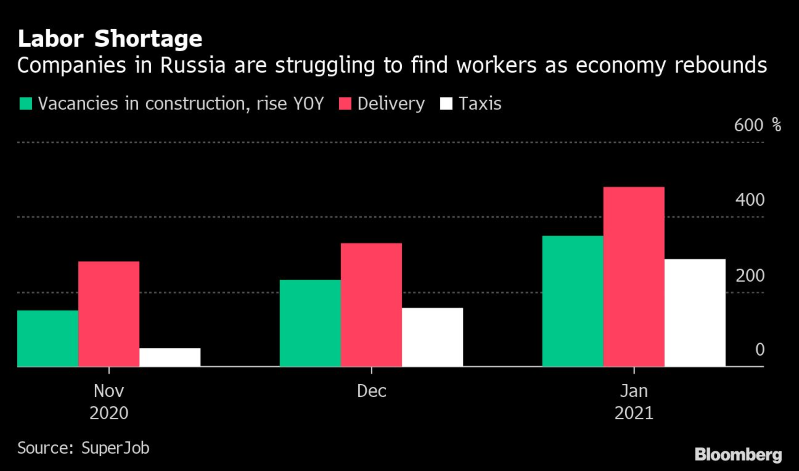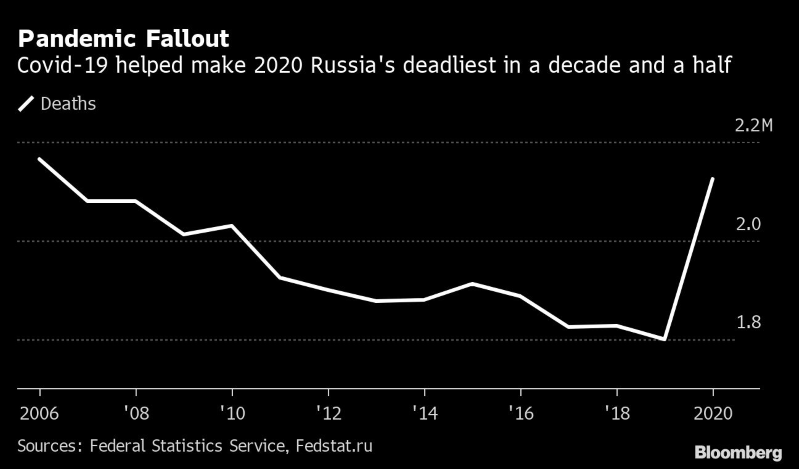
Putin’s Hopes for Fast Recovery Threatened by Worker Deficit
Employers, especially in construction, are struggling to find enough people to fill jobs because coronavirus restrictions have halved the number of immigrants. Companies ranging from gold miners to builders say they’ve been forced to push up wages to attract locals.
Almost half of construction companies surveyed by the national builders union said they have increased pay. MIC Group, a Moscow-based constructor, has hiked wages by as much as 15% on average and that’s helped bring in more staff, said Andrey Ryabinskiy, head of the board of directors.
“It was hard enough to find qualified workers before the pandemic, but now we’re feeling it much more,” he said.

The Kremlin is relying on a rapid recovery from the pandemic to quell growing discontent over falling incomes and rising consumer prices. Despite the success of its Sputnik vaccine, Russia is behind on its ambition to inoculate 60% of the population by the middle of the year.
Russia has already lifted most of its coronavirus restrictions and a recent rally in oil prices should help an economic rebound kick in as soon as the second quarter, but the pace of growth could be limited without an ample supply of workers. A shrinking labor force could shave about 25 basis points off potential growth every year for the next decade, according to Bloomberg Economics.
Russia usually relies on an army of laborers from other parts of the former Soviet Union to help meet the increased demand when the economy picks up, but most borders have been closed for almost a year.
“If the shortages are not solved by March, it will be a big problem,” said Madina Khrustaleva, an analyst at TS Lombard in London. “The need for labor in agriculture will also grow due to seasonality.”

Migrant workers usually make up about 7% of Russia’s workforce and contribute about 6% of gross domestic product, according to Evgeny Vinokurov, chief economist at the Eurasian Development Bank. Developer JSC Inteco, whose contractors use migrant labor for as much as 70% of their workforce, is experiencing slowdowns in “a substantial number of projects,” according to President Alexander Nikolaev. The company has had problems finding local replacements for migrant workers with the right skills even after it pushed up wages by 30%.
“Construction sites are still noticing the shortage of workers, despite the fact that they increased wages,” said Anton Glushkov, president of Nostroi, the national builders union. “This will ultimately result in an increased cost of construction.”
Russia’s already shrinking workforce has also taken a hit from the third-highest Covid-19 death toll in the world last year. The population shrank by almost 700,000 people in 2020, the biggest annual slump in 15 years.
What Our Economists Say:
“The pandemic has increased demand for workers in key sectors, even as restrictions limit the flow of people. In the long term, the workforce is shrinking, and that will be a more structural drag on growth once the economy recovers.”
Scott Johnson, Bloomberg Economics.
Migrants are in such high demand that they made more money on average than Russians in the fourth quarter of last year, according to research by Evgeni Varshaver at the Russian Presidential Academy of National Economy and Public Administration. They earned on average 47,000 rubles ($630) a month, compared to 34,000 rubles for Russians.
Mass vaccinations and border re-openings would help smooth out the bottleneck, but neither are expected in the coming months. Meanwhile, many Central Asian nations, which are a big source of migrant labor, don’t yet have access to any vaccine.
“One of the main outcomes of the pandemic for Russia’s labor market will be a continuing decline in supply, which will keep pressure on wages,” said Sofya Donets, an economist at Renaissance Capital in Moscow.











